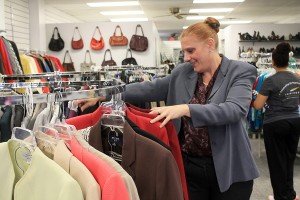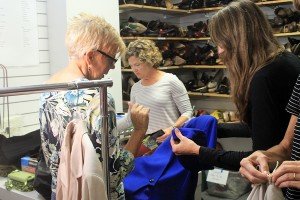Article and photos by MARIA A. HERD
Over 800 economically disadvantaged women received career development help last year from Dress For Success (DFS) Twin Cities, a nonprofit organization located at 1549 University Ave. W.
DFS has been suiting women for interviews and assisting them with job search and retention in Midway for five years.
“This is a great location,” said Program Manager Lily Ubbelohde. “We love how close we are to the light rail (Snelling Ave. Station), and we’re easily accessible off public transportation and from Minneapolis or St. Paul.”
The main mission of DFS is to promote the economic independence of disadvantaged women.
“We work with women across all industries, all fields, all levels; there isn’t a typical Dress for Success client,” said Ubbelohde. “We see women from 18-80, all racial backgrounds and all educational backgrounds.”
DFS, which has only four full time staff members and four contract staff members, really makes DFS a volunteer driven organization. works on a referral basis with over 180 partner organizations, including local homeless and domestic abuse shelters, the Department of Labor, and other government agencies and social services.
These organizations will often refer women seeking employment to DFS, and they in turn frequently refer women to other social services. The partnerships help DFS clients overcome barriers that could keep them from holding down a job such as a lack of shelter, food, child care or transportation.
“There are so many amazing community partners that are already doing phenomenal work,” said Ubbelohde. “We don’t want to be a one stop shop. We really want to do what we do, and do it well, while being sure that our clients are getting their needs met.”
 Suiting Coordinator Yvonne Williams feels a strong connection to many of the women who come through the doors at DFS because of the hardships she overcame in her life, including teen pregnancy, depression, prostitution and drug abuse. “When I see them blossom while they’re here, well it’s very encouraging,” she said.
Suiting Coordinator Yvonne Williams feels a strong connection to many of the women who come through the doors at DFS because of the hardships she overcame in her life, including teen pregnancy, depression, prostitution and drug abuse. “When I see them blossom while they’re here, well it’s very encouraging,” she said.
Photo left: Yvonne Williams formerly utilized Dress For Success’s services and is now employed full time as the Suiting Program Coordinator. She looks through donated suits to prepare for a suiting appointment with a client. (Photo by Maria A. Herd)
Williams first came to DFS as a temporary receptionist after being unemployed for eight years and struggling with mobility issues. She was placed in the position by a partner organization to be observed an office setting.
Williams loved the work and atmosphere at DFS so much that after her observation was over, she continued volunteering at the front desk for three years. Then through donation funding, Williams was hired on as a full-time employee last January.
Watching women come into their suiting appointments shy and intimidated, yet leaving happy andconfident, is her favorite part of the job.
“Seeing this transition in such a short amount of time and being able to help women in whatever their situation may be—being able to boost them up a little bit—brings tears,” said Williams.
Over 80 percent of DFS clients utilize its suiting program. At suiting appointments, women meet one-on-one with an image coach who helps them pick out a professional outfit and cure any jitters they might have about their interview or a new job.
“We’re preparing them to not only get ready on the outside for their new experience but so that they also feel ready on the inside,” said Ubbelohde.
Women preparing for an interview are suited head to toe with a pair of shoes, a handbag, and an outer jacket if necessary. If a woman is starting a new job, she is given a weeks worth of professional clothing to mix and match.
“The confidence level is really brought up when you’re wearing something that’s stylish and fits well,” said Molly, a DFS client, and volunteer. Her name has been in changed in this story for privacy reasons.
A dislocated worker, Molly has recently started her job search after being unemployed for several years. Back in the day she volunteered for five local food shelters and is now surprised to find herself seeking help from others.
“I never thought in my wildest dreams that I would be on the other side to receive instead of give.That is a heartbreaking thing to be the one on the other side, when I’ve always, always been on the giving end,” she said. But because of the ongoing support at DFS to find employment, “I feel very confident that it is not going to be for long.”
DFS is a volunteer driven organization. A third of their funding comes from individual support, one-third is corporate support, and the final third of the budget are grants. Over 300 people volunteer at DFS annually, and about 400 pounds of clothing are donated weekly.
 Volunteer sorters go through the donations, looking for items that are fashionable and in good condition.
Volunteer sorters go through the donations, looking for items that are fashionable and in good condition.
Photo right: Volunteer sorters inspect donations in the back room for items that are business appropriate and in good condition. (Photo by Maria A. Herd)
“My goal is that when our women walk into the waiting room for an interview, they can’t tell the difference between our women and anybody else who is interviewing for that position,” said Ubbelohde.
The sorters estimate that they keep about 25 percent of donated clothes, while the rest is re-donated to other organizations.
Everything from hair pieces to jewelry to undergarments is available for women in need.
“When we work with women as they are transitioning out of homelessness or fleeing a domestic abuse situation, sometimes they don’t always have a chance to pack an extra pair of underwear,” said Ubbelohde.
Although DFS is most well-known for its suits, Ubbelohde says it’s the career development programs that make the biggest difference in women’s lives. This is referred to in the hashtag “#beyeondthesuit”.
“We want people to understand we do so much more than suits. Suits are what get people in the door. But suits don’t get you a promotion, suits don’t help stabilize your life, suits don’t pay the bills,” she said.
About 40 women annually participate in DFS’s job search class called Going Places Network, referred to as GPN. The class meets twice a week for 10 weeks in downtown Minneapolis at business community parter offices and the DFS office in Midway. Women build self-esteem as well as interviewing, job searching, resume, and cover letter skills. Walmart Foundation sponsors the class through a grant.
On average participants have been unemployed for over a year, so getting them into the routine of attending classes and connecting with other women is impactful said Ubbelohde.
Holding half of the classes downtown also gives women experience maneuvering their way through the business world.
Molly said that the classes made her more comfortable with public transportation, allowing her to focus more on responses to a hiring manager’s questions.
“It dispels that nervous feeling so you can concentrate on what’s most important and keeping your chin up,” she said.
Molly also highlighted the unique social aspect of GPN. Sometimes women can be exclusive and competitive, “but here we are GPN sisters. We are all rooting for each other and praying for each other,” she said.
GPN gave Williams the confidence to overcome her criminal record barrier during her employment search. She explained that it’s better to be upfront about one’s criminal background and then turn it into a positive by demonstrating recent self-improvement.
DFS follows up with graduates 30, 60 and 90 days after the class is over. Within 90 days, 70 percent of GPN graduates have found employment.
“We’re especially proud of that statistic,” said Ubbelohde, noting that the DFS Twin Cities office has some of the highest numbers in the country for GPN.
The Professional Intelligence Initiative (PII) is another successful career development program at DFS. The 14-month job retention course was created a year ago specifically for the Twin Cities market by co-founder and CEO Jeri Quest.
Quest saw the need for a job-retention program because it was common for clients to cycle in and out of unemployment quickly.
The first six months consist of classes on time management, critical thinking, emotional intelligence and financial education to help women stabilize their lives and be successful at work.
Women also receive encouraging cards and notes from an anonymous “angel” to offer support. Then, each participant is partnered with a mentor—a business woman in the community who has 10 or more years of experience—to offer professional guidance for the last eight months of the course.
DFS holds graduation ceremonies for the graduates of their programs. Williams graduated from both the GPN course and the PII course. “You feel special, you’re given a little gift bag and certificate, and you walk away with the tools and confidence to continue your journey,” she said.
The third program at DFS is the Professional Women’s Group, which is more of a support network than a class. The group meets monthly for activities and speakers that cover topics from managing personal finances to eating healthy on a budget to laughter yoga. The women often bring their work problems to the group for advice, but also celebrate new jobs and promotions together. The Professional Women’s Group gives these women “the tools that they need to create social support in a way that social services can’t provide for them,” said Ubbelohde.
Molly believes that the ongoing support at DFS is what sets the organization apart from other services. “I have heard that this is something other programs lack,” she said. “For them, it’s something like there is this program for one day or five days, and then ‘bye you’re on your own.’”
But DFS works hard to provide its clients with tools that they can utilize when barriers arise and a supportive network to be successful.
Comments
No comments on this item Please log in to comment by clicking here